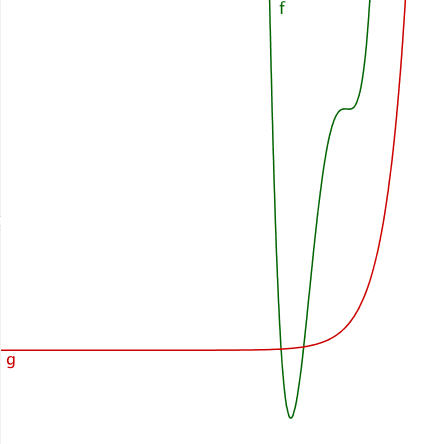Differentiability at origin | I.S.I. B.Stat, B.Math Subjective 2017
 Join Trial or Access Free Resources
Join Trial or Access Free Resources Join Trial or Access Free Resources
Join Trial or Access Free ResourcesTry this problem from ISI B.Stat, B.Math Subjective Entrance Exam, 2017 Problem no. 3 based on Differentiability at origin.
Problem: Differentiability at origin
Suppose \( f : \mathbb{R} \to \mathbb{R} \) is a function given by $$
f(x) = \left\{\def\arraystretch{1.2}%
\begin{array}{@{}c@{\quad}l@{}}
1 & \text{if x=1}\\ e^{(x^{10} -1)} + (x-1)^2 \sin \left (\frac {1}{x-1} \right ) & \text{if} x \neq 1\ \end{array}\right.
$$
Discussion:
a)First of all we need to check whether \(f'(1)\) exists or not.
We will proceed with the first principle.
Let us check the Right hand derivative(RHD) and Left hand derivative(LHD) of \(f\) at \(x=1\).
RHD at \(x=1\) is
\(\lim_{h\to0}\frac{f(1+h)-f(1)}{h}\\=\lim_{h\to0}\frac{e^{((1+h)^{10}-1)}+h^2\sin( \frac{1}{h})-1}{h}\\=\lim_{h\to0}\frac{e^{((1+h)^{10}-1)}-1}{h}+\lim_{h\to0}h\sin( \frac{1}{h})\\=\lim_{h\to0}\frac{e^{((1+h)^{10}-1)}-1}{(1+h)^{10}-1}\frac{(1+h)^{10}-1}{h}+0=10\)
LHD at \(x=1\) is
\(\lim_{h\to0}\frac{f(1-h)-f(1)}{-h}\\=\lim_{h\to0}\frac{e^{((1-h)^{10}-1)}+h^2\sin( \frac{1}{-h})-1}{-h}\\=\lim_{h\to0}\frac{e^{((1-h)^{10}-1)}-1}{-h}+\lim_{h\to0}(-h)\sin( \frac{1}{-h})\\=\lim_{h\to0}\frac{e^{((1-h)^{10}-1)}-1}{(1-h)^{10}-1}\frac{(1-h)^{10}-1}{-h}+0=10\)
Thus,LHD=RHD.
Hence \(f'(1)\) exists and it is equal to \(10\).
(b)
\( \displaystyle{\lim_{u \to \infty } \left [ 100 u - u \sum_{k=1}^{100} f \left (1 + \frac {k}{u} \right ) \right ] }\)
As u becomes infinitely large k/u becomes arbitrarily small for finite value of k (clearly k is finite as we are interested in k=1 to 100).
Hence \( f \left ( 1 + \frac {k}{u} \right )\) is nothing but f of (1 plus an infinitesimal positive quantity). This tells us \( f \left ( 1 + \frac {k}{u} \right )\) is almost waiting to become the derivative of f at x=1. And we already know that such a derivative exists from part (a).
With this motivation, divide and multiply by \( \frac{k}{u} \).
\( \displaystyle{\lim_{u \to \infty } \left [ 100 u - u \sum_{k=1}^{100} f \left (1 + \frac {k}{u} \right ) \right ] \\ =\lim_ {u \to \infty} \left [ 100 u -\sum_{k=1}^{100} k \frac{f\left (1+\frac{k}{u} \right ) } {\frac{k}{u}} \right ]\\=\lim_ {u \to \infty} \left [ \sum_{k=1}^{100} k \frac{1-f\left (1+\frac{k}{u} \right ) } {\frac{k}{u}} \right ]\\ =\sum_{k=1}^{100} k \lim_ {u \to \infty}\frac{f(1)-f\left (1+\frac{k}{u} \right ) } {\frac{k}{u}} \\ =\sum_{k=1}^{100} k \times(- f'(1)) \\ = -10\times \left(\frac{100\times101}{2} \right )\\ =-50500 }\)
[…] frac {k}{u} right ) right ] }) ……………………… Discussion […]